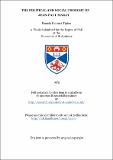The political and social thought of Jean-Paul Marat
Abstract
A study of the political and social thought of Jean-Paul Marat was undertaken in an attempt to establish whether this eighteenth-century personality, of notorious yet poorly understood proportions, might in any way be considered an original theorist. The clarification of this point is presented as one answer to the credibility of the historical and contemporary notion of “maratism” and the “maratiste” as representative of a distinctive theory. Respecting the chronology of Jean-Paul Marat’s writings, his first political treatise, The Chains of Slavery of 1774, is analyzed within the framework of its debt to English radicalism. Marat is then followed to France, where a decade before the Ancien Régime was to expire, the Plan de législation criminelle was written. Having discussed the rudiments of the pre-revolutionary’s political and social thought as epitomized by these works, the outbreak of the French Revolution introduces Jean-Paul Marat in his first and most important revolutionary vocation as the journalist of L’Ami du Peuple. Henceforward, the evolution of Marat’s revolutionary thought is first examined in the context of his professional capacity, where increasing intolerance and suspicion of other journalists testify to his radicalization. Next, consideration is given to the metamorphosis of his revolutionary ideal, or the discovery of the “people” and their requisite virtue of “esprit public”. This, in turn, raises the questions of how Marat proposed to achieve the revolution in the name of his new elite. His two principal methods of violence and dictatorship are therefore probed. And, in keeping with the pervading negative vein of Marat’s teachings, those whom he considered a permanent threat to any society are revealed as Marat, the Friend of the People, perceived them. Finally, the thought of Jean-Paul Marat is reviewed from the perspective of his relationship to the clubs and of his turbulent but short-lived career as a representative of the people, which was brought to a dramatic end by the knife of Charlotte Corday. On the basis of the foregoing analyses, it is concluded that although Marat was the first to synthesize many ideas subsequently to be adopted by the revolution, he was not an original theorist. It is contended, therefore, that the significance of the terms “maratism” or “maratiste” remains vacuous on a theoretical level.
Type
Thesis, PhD Doctor of Philosophy
Collections
Items in the St Andrews Research Repository are protected by copyright, with all rights reserved, unless otherwise indicated.

